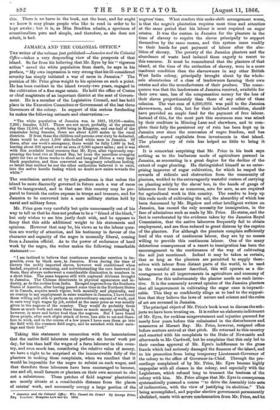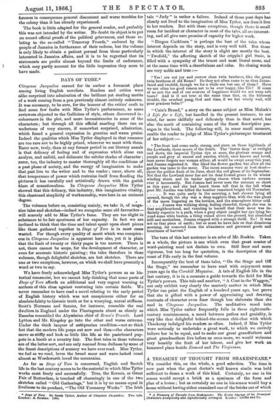JAMAICA AND THE COLONIAL OFFICE.* THE writer of the volume
just published--Jamaica and the Colonial Office—takes a very desponding view of the prospects of that island. So far from his believing that Mr. Eyre by his " vigorous action" saved the white population from death, he says in his preface, " My own impression is very strong that his ill-considered severity has simply initiated a war of races in Jamaica." The position of Mr. Price gives weight to his opinions on such a point. He has been resident in the island twenty-two years, engaged in the cultivation of a fine sugar estate. He held the office of Custos or chief magistrate of an important district at the seat of Govern- ment. He is a member of the Legislative Council, and has held place in the Executive Committee or Government of the last three Governors of the colony. In support of this serious foreboding he makes the following estimate and observations :—
"The white population of Jamaica was, in 1861, 13,816—males, 7,295; females, 6,521. There are not more, probably, at the present day than 12,500, of whom, 4,000 being in Kingston, and one-half of the remainder being females, there are about 4,500 males in the rural districts. If from these the children and persons over sixty be deducted, there would be about 1,500 able-bodied white men in Jamaica. Of these, after one week's emergency, there would be fully 1,000 in bed, leaving about 500 spread over an area of 6,000 square miles ; and it was with this available local resource that Mr. Eyre, after vigorously sup- pressing the local riot at Morant Bay, let loose the merciless avenging spirit for two or three weeks to shoot and hang ad libitum a very large black population, and thus converted an imaginary rebellions feeling, so latent that neither he nor the other authorities believed it to exist, into the active hostile feeling which no doubt now exists towards the white."
The conclusion arrived at by this gentleman is that unless the island be more discreetly governed in future such a war of races will be inaugurated, and in that case this country may be pre- pared to furnish the entire expense in troops and treasure, and for Jamaica to be converted into a mere military station held by naval and military force.
Mr. Price goes very carefully but quite unnecessarily out of his way to tell us that he does not profess to be a " friend of the black," but only wishes to see him justly dealt with, and he appears to fancy that this adds additional weight to his statements and opinions. However that may be, his views as to the labour ques- tion are worthy of attention, and his testimony in favour of the character and capacity of the negro is unusually liberal, coming from a Jamaica official. As to the power of endurance of hard work by the negro, the writer makes the following remarkable statement :— "I am inclined to believe that continuous muscular exertion is im- possible, even by black men, in Jamaica. Even during the time of slavery the newly imported slaves, however well conditioned when landed, required a seasoning, and notwithstanding the care bestowed on them, they always underwent a considerable diminution in numbers in a short time. The same happens still with captured Africans brought to Jamaica. The Chinese deteriorate in physical appearance and in- dustry, as do the coolies from India. Escaped negroes from the Southern States of America, after having passed some time in the Northern States or in Canada, acquire much vigour, both mentally and physically, and on coming to my employment in some numbers in Jamaica, I have found them willing and able to perform an extraordinary amount of work, and to earn very high wages by job, settled at the same price as was usually given to the negroes of the country. They would do probably three times as much work and earn three times as much money, spending it, however, in more and better food than the negroes. But I have found these people, after each slight attack of fever, less able to eat and there- fore to work, and in the course of a few years I have seen them go into the field with the common field negro, and be satisfied with their earn- ings and their food."
Taking this statement in connection with the lamentations that the native field labourers only perform six hours' work per day, for less than half the wages of a farm labourer in this coun- try, and even much less, considering the relative value of money, we have a right to be surprised at the inconceivable folly of the planters in making these complaints, when we recollect that it would be impossible for the negro to subsist on such wages, and that therefore these labourers have been encouraged to become, one and all, small farmers or planters on their own account to eke out a subsistence. These patches of field negroes' plantations are mostly situate at a considerable distance from the places of estates' work, and necessarily occupy a large portion of the
• Jamatea and the cotosiat Office: Who Caused the Crisis? By George Price, Leg. Loudon: Sampson Low and Co. 1886. negroes' time. What renders this make-shift arrangement worse,, is that the negro's plantation requires most time and attention at the same period that his labour is most required on sugar estates. It was the custom in Jamaica for the planters in the time of slavery to require the slaves principally ter support themselves by the same means, and this system came readily to their hands for part payment of labour after the abo- lition of slavery. The poverty of the Jamaica planters and the- abundance of waste land induced them eagerly to resort to- this resource. It must be remembered that the planters of that island, at the time of the extinction of slavery, were in a more insolvent condition than the slaveowners in any other British West India colony, principally brought about by the whole- sale absenteeism of a class of landowners farming their own- estates and also the manufacturers of their produce. The conse- quence was that the landowners of Jamaica received, available for their own uses, less of the compensation money for the loss of` their slaves proportionately than those of any other of these colonies. The vast sum of 6,000,0001. was paid to the Jamaica, slaveowners, and this, but for their indebted condition, should' have provided an ample fund for the payment of free labour- Instead of this, for the most part this enormous sum was seized, by their creditors in Mincing Lane and elsewhere, and to com- plete their folly the persistent cry of ruin has been kept up in Jamaica ever since the concession of negro freedom, and has- effectually scared capitalists from investments in that island. The planters' cry of ruin has helped no little to bring it about.
It is somewhat surprising that Mr. Price in his book says- nothing as to the barbarous mode of agriculture pursued in Jamaica, as accounting in a great degree for the decline of the- extent of sugar planting. He distinguished himself as an enter- prising improver of sugar cultivation, for which he reaped the- rewards of ridicule and obstruction from the community of planters, wedded to the extravagantly wasteful custom of carrying- on planting solely by the slaves' hoe, in the hands of gangs of labourers four times as numerous, acre for acre, as are required for agricultural work in this country. The resolve to keep up- this rude mode of cultivating the soil, the absurdity of which has been denounced by Mr. Bigelow and other intelligent writers on Jamaica, has caused the only necessity for immigration, in the- face of admissions such as made by Mr. Price. He states, and the- fact is corroborated by the evidence taken by the Jamaica Royal Communion, that the native labourers frequently fail to obtain employment, and are thus reduced to great distress by the caprice of the planters. For although the planters complain sufficiently loud of the want of continuous labour, they are by no means willing to provide this continuous labour. One of the many deleterious consequences of a resort to immigration has been the encouragement to the continuance of the way of cultivating the soil just mentioned. Indeed it may be taken as certain, that so long as the planters are permitted to supply them- selves with labour from distant parts of the world, to be used in the wasteful manner described, this will operate as a dis- couragement to all improvements in agriculture and economy of labour. For this unfortunately the planter needs no such incen- tive. It is the commonly avowed opinion of the Jamaica planters that all improvement in cultivating the sugar cane is impracti- cable. This they so confidently allege as to lead to the supposi- tion that they believe the laws of nature and science and the rules of art are reversed in Jamaica.
The principal object of Mr. Price's book is not to discuss the sub- jects we have been treating on. It is rather an elaborate indictment, of Mr. Eyre, for reckless misgovernment and injustice pursued for nearly four years before this culminated in the disturbances and massacres at Morant Bay. Mr. Price, however, resigned office before matters arrived at that pitch. He returned to this country and resorted with his complaints to the Duke of Newcastle and afterwards to Mr. Cardwell, but he complains that this only led to their careless approval of Mr. Eyre's indifference to the gross frauds which had seriously damaged the finances of the island, and to his promotion from being temporary Lieutenant-Governor of the colony to the office of Governor-in-Chief. Through the pro- ceedings complained of by Mr. Price, Mr. Eyre became highly unpopular with all classes in the colony, and especially with the Legislature, which refused long to transact the business of the colony with him. Mr. Price alleges that Mr. Eyre in consequence systematically pursued a course " to drive the Assembly into acts of indiscretion, with the view of justifying its abolition." This being accomplished, and popular elective government permanently abolished, meets with severe coudetunAtiou from Mr, Prise, and ha foresees in consequence general discontent and worse troubles for the colony than it has already experienced.
The book is little adapted for the general reader, and probably this was not intended by the writer. No doubt its object is to put on record official proofs of the political grievances, and those re- lating to the so-called "Tramway Frauds," endured by the people of Jamaica in furtherance of their redress, but the volume is only likely to obtain a patient perusal from those particularly interested in Jamaica affairs, and it is to be regretted that its statements are prolix almost beyond the limits of endurance, which may partly account for the little impression they seem to have made.































 Previous page
Previous page